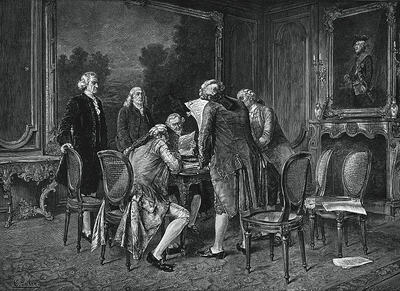
Delegates at the Treaty of Rae (1846)
The Treaty of Rae was signed in 1846. It principally gave independence to the Duchy of Estonia but also radically altered the relationship between Denmark and its subject territories.
The main impetus of the treaty was to settle the situation with Novgorod. Finland had won the 3rd Karelian War and imposed a harsh treaty on Novgorod in 1843. Fearing a collapse of Novgorod, and the inevitable strengthening of Tver and Vladimir beyond it, Denmark, and the Kalmar Union, revised the treaty in 1846 to lessen Novgorod's losses and compel Finland to make Karelia independent. As a part of this it tried to lessen Denmark's direct presence on Novgorod's borders and to this end it made Estonia independent.
Estonia had always been governed by a branch of the Estridsson family however had become thoroughly Estonianised over the centuries. By the treaty the Ducal family was handed full authority over the state and allowed to convene their own government without Danish supervision (although membership of the Kalmar Union was mandatory).
Many hard-liners in the Danish Riksdag were indignant during the run up to the conference at Rae, angry that Denmark should be giving up territory. To placate them the royal council hastily drafted the 'New Act of Union' which rationalised the remaining Danish lands in Europe.
Previously the crowns of Viken, Lower Saxony, Rugia and Pomerania had been kept separate from that of Denmark and the separate kingdoms had had some small degree of autonomy. However after the Act and Treaty all would be governed directly from Copenhagen. Rather than being known as 'King of Denmark, Viken, Lower Saxony, Pomerania and Prince of Rugia' Christian II would be simply known as 'King of Denmark'.
This rather rushed and short-sighted piece of legislation, effectively signed into law at Rae as Estonia was given its freedom, stored up issues for the future. Although Viken, Saxony and Rugia were largely fine with being ruled from Copenhagen, Pomerania was adverse to direct rule. Denmark was currently in the midst of the First Imperial-Kalmar War (1842-1850), specifically to hold on to Pomerania and opinions were hardening on separatist movements there. Thanks to several prominent Pomersk thinkers it had begun to regard itself as a unjustly conquered land rather than a naturally Danish province. The snuffing out of its local Diet, while it made sense to the politicians and generals fighting the war with the Empire, was regarded by many as an unjust act and hence it felt it was well within its rights to continue to appeal to the Imperial Diet in Frankfurt for support.
| ||||||||||||||||||||||
| ||||||||||||||||||||


